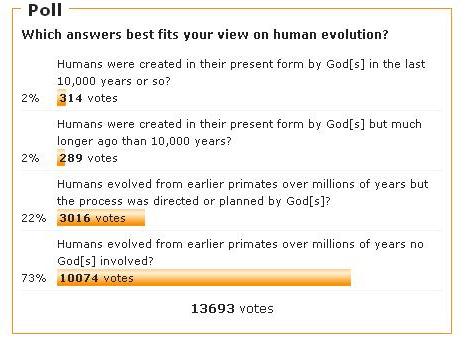Not in the general population, alas. But a poll in a recent front-page post at Daily Kos, Hobbits 2.0?, had some stunning numbers:

The poll was about which viewpoint best fits the site contributors’ positions on human evolution, with four options corresponding to young-earth creationism, old-earth creationism, theistic evolution, and non-theistic evolution (i.e., no god involved). Not surprisingly for a progressive political site, the two creationist options received negligible support. But what I found stunning was that the no-god-involved response enormously outweighed the theistic evolution response, by a margin of better than 3-to-1!
This is a very significant result when one considers where it appeared. Daily Kos is the largest progressive political blog on the internet, averaging around 1 million hits per day, and represents a vast community of involved, motivated writers, donors, voters and activists. The fact that nonbelievers apparently predominate by such an overwhelming margin is an extremely encouraging indicator that atheists and freethinkers are becoming more and more politically involved and active, and cements our status as an important bloc of swing voters. Some would-be atheist leaders may think we should sit out elections, but this result, thankfully, is a fairly good sign that atheists in general firmly reject that defeatist strategy.
This result also, I think, conclusively refutes the all-too-common cynicism which holds that there is no meaningful difference between the two American political parties. I can personally guarantee that no major Republican or conservative site is going to show poll results anything at all like this. (Exhibit A.) I grant that there is often not enough of a difference between the two parties on several important issues. But for any American voter who cares about freedom of conscience, the choice is clear: in their present incarnation, Republicans are unapologetically the party of dominionism and theocracy. Democrats, even if they spend far too much time pandering to religious sentiment, are much more reliable when it comes to obeying the separation of church and state.
Granted, some caveats are in order: we shouldn’t put too much stock in this poll. This result is hardly scientific – its respondents are self-selected. Since the poll appeared only on the web, the respondents are likely to be disproportionately drawn from younger voters, whom we already know are increasingly secular. And since it appeared at the end of a science-related post, it’s likely to gather respondents interested in science and technology, whom we can expect to be even more secular than young voters in general. As a reflection of the general electorate, it’s not likely to be at all accurate. But it does show that there is a substantial number of freethinkers who are politically informed and active. In an America where religious voters’ loyalties are already well established, this should be a bright, blinking message for political candidates. The next one who spends some time addressing our concerns just might end up getting into office.